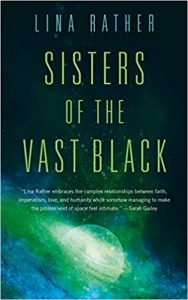Liz Bourke Reviews Sisters of the Vast Black by Lina Rather
 Sisters of the Vast Black, Lina Rather (Tor.com Publishing 978-1-250-26025-3, $14.99, 170pp, tp) October 2019. Cover by Drive Communication.
Sisters of the Vast Black, Lina Rather (Tor.com Publishing 978-1-250-26025-3, $14.99, 170pp, tp) October 2019. Cover by Drive Communication.
I’d never heard of Lina Rather before I was informed I should keep an eye out for Sisters of the Vast Black. The words used to engage my attention were “nuns, lesbians, living ships, and murderous political conspiracies,” and that definitely worked, so maybe I should have heard of Lina Rather before. Sisters of the Vast Black does indeed contain nuns, lesbians, living ships, and murderous conspiracies, wrapped up in a quiet, character-focused story about faith, growth, and the nature of moral and political authority.
A small convent of Catholic nuns, the Order of St. Rita, (who don’t appear to be connected to any wider order, and seem to have no connections to a motherhouse) dwell aboard the living ship Our Lady of Impossible Constellations. They seem to be a mendicant order, more focused on the care of bodies than the care of souls, for whom any apostolic or evangelising sense of mission is decidedly secondary to doing good in the present world. There are plenty of good works to accomplish, regardless: the massively destructive war between Earth and its colonies may have been over for a generation, but its wake made more work, not less, for mendicant orders.
We first meet the sisters of the Order of St. Rita as they debate how to respond to their living ship’s current status. The living ship is in a situation unbecoming to a convent: it wants to breed. The sisters cannot agree whether this is theologically, doctrinally, or morally acceptable. The Reverend Mother – under a vow of silence since her novitiate – is willing to let the sisters argue for a little longer. The Reverend Mother is also, however, in the early stages of some form of dementia, which her sisters have so far been able to avoid acknowledging.
In addition to the Reverend Mother, there are three sisters who provide a viewpoint on the action. Sister Gemma, whose role has led her to specialise in the living ship and its functions, and who has been researching whether the ship’s immunity to diseases can be used to help humans, but who is currently wrestling with the contradiction between her faith, her commitment to the order, and her growing affection for a woman outside the community of faithful (the Catholicism of the future has, it seems, finally gotten over the idea that queer relationships are inherently sinful). Sister Lucia is primarily a doctor, whose religious calling arose from her deep and abiding love and wonder for the universe, and whose friendship with Gemma is tested by Gemma’s decisions about the future of her faith. Sister Faustina has served as a nun for 16 years but has no religious calling at all whatsoever, apart from the call to do good. Sr. Faustina is the most suspicious of authority of all the sisters, and when she receives a message – for she is in charge of communication – from the Vatican with news that also assigns Our Lady of Impossible Constellations a supervisory priest, she wonders at the new political direction of the Church, and what it has to do with the renewed arrogance of Earth’s central government. When a distress call reaches Our Lady of Impossible Constellations, the faith of all the sisters will be tested by what they discover, about church, state, and themselves.
This is an elegant and eloquent novella, tightly focused on its characters and their world, which is at once strictly bounded (by the rules of their religious order, and by the constraints of living in space) and incredibly vast. Rather examines questions of ethics and responsibility, and the tension between questions of conscience, respect, and love. (There’s less on atonement and guilt, but perhaps future Catholicism has developed in some newer and healthier ways.) It’s a generous novella, warm and forgiving, with an explosive conclusion that still, somehow, manages to fit precisely with what came before. I enjoyed it immensely, and I hope to enjoy more of Lina Rather’s work in the future.
Liz Bourke is a cranky queer person who reads books. She holds a Ph.D in Classics from Trinity College, Dublin. Her first book, Sleeping With Monsters, a collection of reviews and criticism, is out now from Aqueduct Press. Find her at her blog, her Patreon, or Twitter. She supports the work of the Irish Refugee Council and the Abortion Rights Campaign.
This review and more like it in the October 2019 issue of Locus.
 While you are here, please take a moment to support Locus with a one-time or recurring donation. We rely on reader donations to keep the magazine and site going, and would like to keep the site paywall free, but WE NEED YOUR FINANCIAL SUPPORT to continue quality coverage of the science fiction and fantasy field.
While you are here, please take a moment to support Locus with a one-time or recurring donation. We rely on reader donations to keep the magazine and site going, and would like to keep the site paywall free, but WE NEED YOUR FINANCIAL SUPPORT to continue quality coverage of the science fiction and fantasy field.






